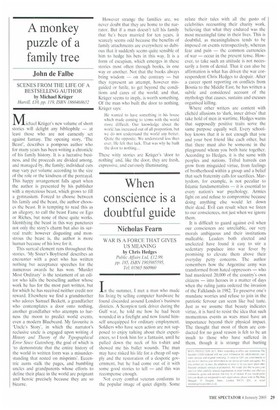A monkey puzzle of a family tree
John de Falbe
SCENES FROM THE LIFE OF A BESTSELLING AUTHOR by Michael Kruger Hamill, £10, pp. 119, ISBN 1860468632 Michael Krtiger's new volume of short stories will delight any bibliophile — at least those who are not earnestly set against fantasy. The opening story, 'The Beast', describes a pompous author who for many years has been writing a chronicle of his family history. It is a lucrative business, and the proceeds are divided among, and managed by, the family; individual cuts may vary per volume according to the size of the role or the kindness of the portrayal. This happy arrangement falls apart when the author is presented by his publisher with a mysterious beast, which grows to fill a gymnasium. Forced to choose between his family and the beast, the author chooses the beast. It is tempting to read this as an allegory, to call the beast Fame or Ego or Riches, but none of these quite works. Identifying the beast in this way punctures not only the story's charm but also its surreal truth: however disgusting and monstrous the beast is, the author is more human because of his love for it.
This surreal element runs throughout the stories. 'My Sister's Boyfriend' describes an encounter with a poet who has written nothing but acceptance speeches for the numerous awards he has won. 'Murder Most Ordinary' is the testament of an editor who kills the bestselling author whose work he has for the most part written, but for which he has received neither credit nor reward, Elsewhere we find a grandmother who adores Samuel Beckett, a grandfather who contemplates a door onto nothing, another grandfather who attempts to harness the moon to predict world events, even a modern Bluebeard. My favourite is 'Uncle's Story', in which the narrator's reclusive uncle is engaged upon writing A History and Theory of the Typographical Error Since Gutenberg, the goal of which is 'to demonstrate that the entire history of the world in written form was a misunderstanding that rested on misprints'. Eccentric aunts stalk the pages, and bumbling uncles and grandparents whose efforts to define their place in the world are poignant and heroic precisely because they are so bizarre. However strange the families are, we never doubt that they are home to the narrator. But if a man doesn't tell his family that he's been married for ten years, it scarcely seems odd because the benefits of family attachments are everywhere so dubious that it suddenly seems quite sensible of him to hedge his bets in this way. It is a form of escapism, which emerges in these stories most often through books, in one way or another. Not that the books always bring wisdom — on the contrary — but they represent an attempt, however misguided or futile, to get beyond the conditions and cares of the world; and that, Krt.iger seems to imply, is worth something. Of the man who built the door to nothing, Kruger says:
He wanted to have something in his house which made coming to terms with the world more difficult. Our knowledge about the world has increased out of all proportion, but we do not understand the world any better. Quite the opposite. We understand less than ever. He felt that lack. That was why he built the door to nothing...
These witty stories are Krfiger's 'door to nothing' and, like the door, they are fresh, expressive, and curiously illuminating.


















































 Previous page
Previous page